Unit 5 Water课件50张2021-2022学年牛津深圳版七年级英语下册
文档属性
| 名称 | Unit 5 Water课件50张2021-2022学年牛津深圳版七年级英语下册 |
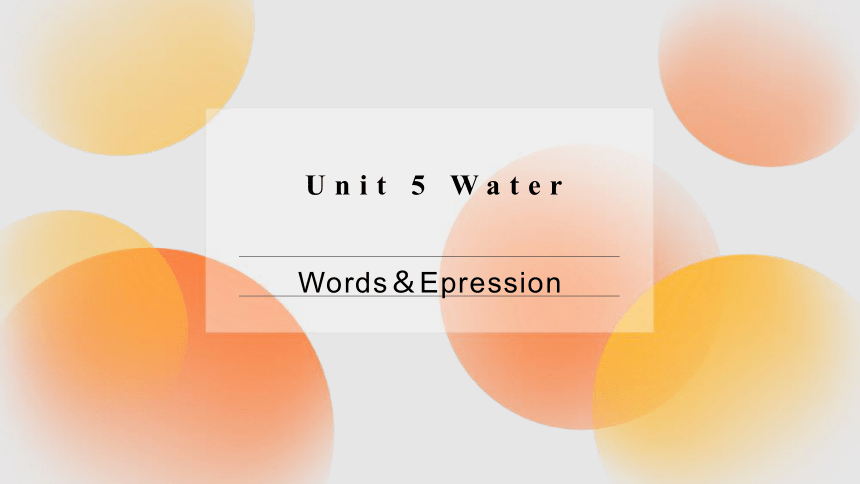
|
|
| 格式 | pptx | ||
| 文件大小 | 2.2MB | ||
| 资源类型 | 教案 | ||
| 版本资源 | 牛津深圳版 | ||
| 科目 | 英语 | ||
| 更新时间 | 2022-03-22 00:00:00 | ||
图片预览

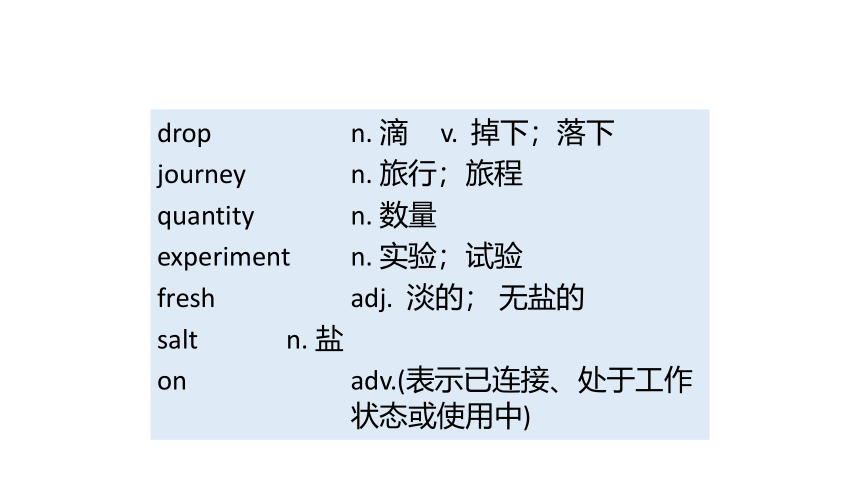
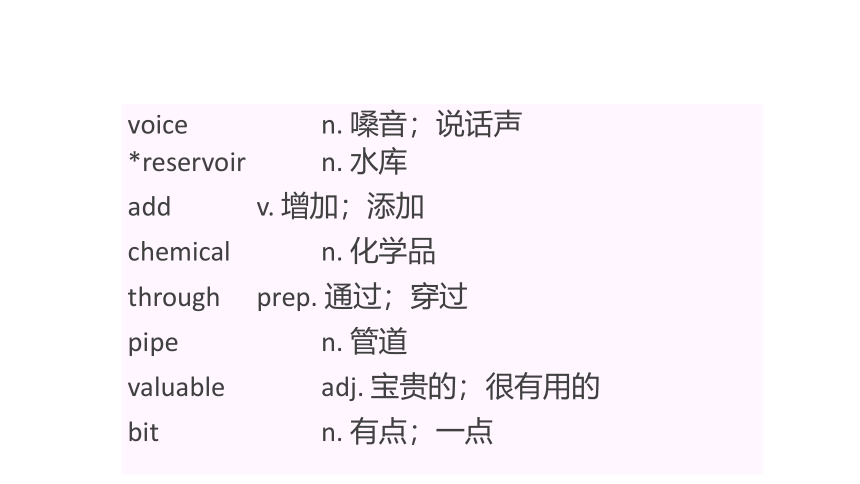
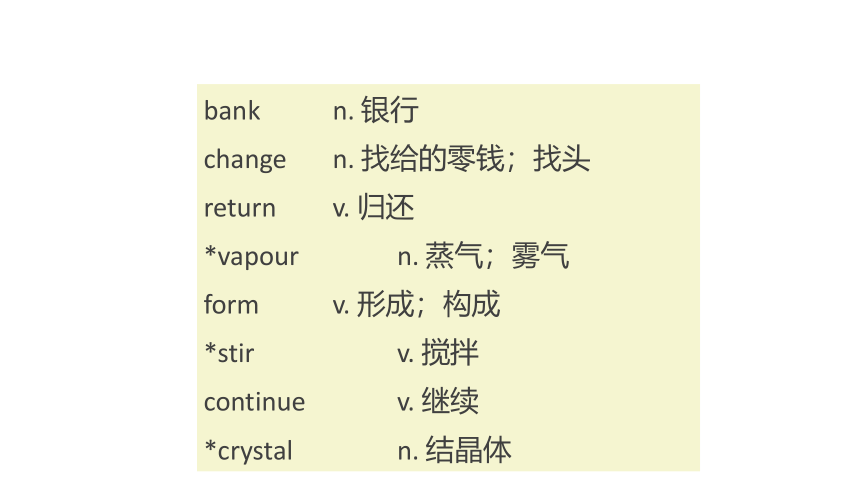
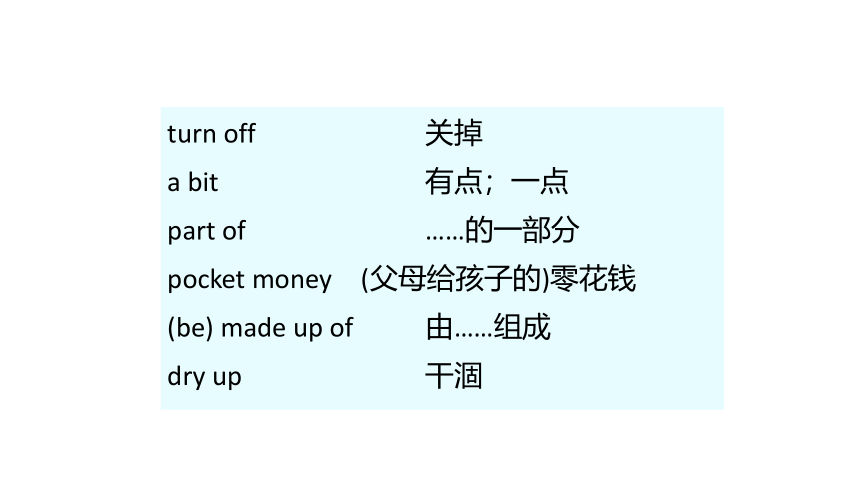
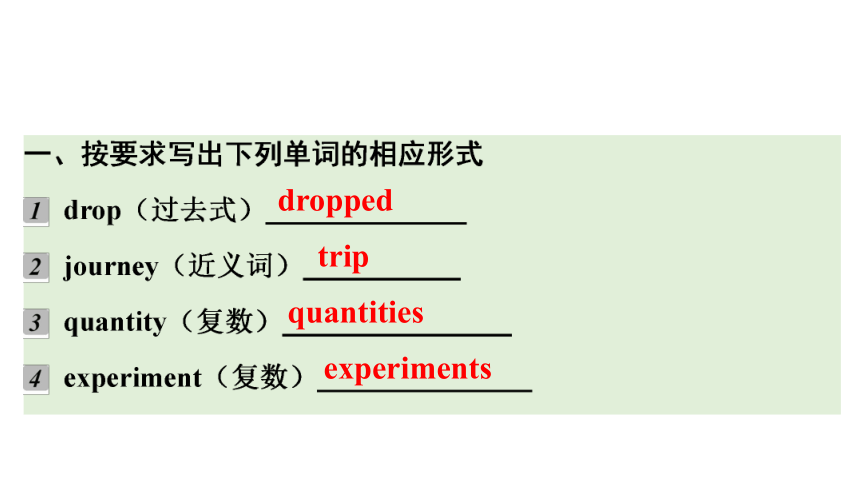
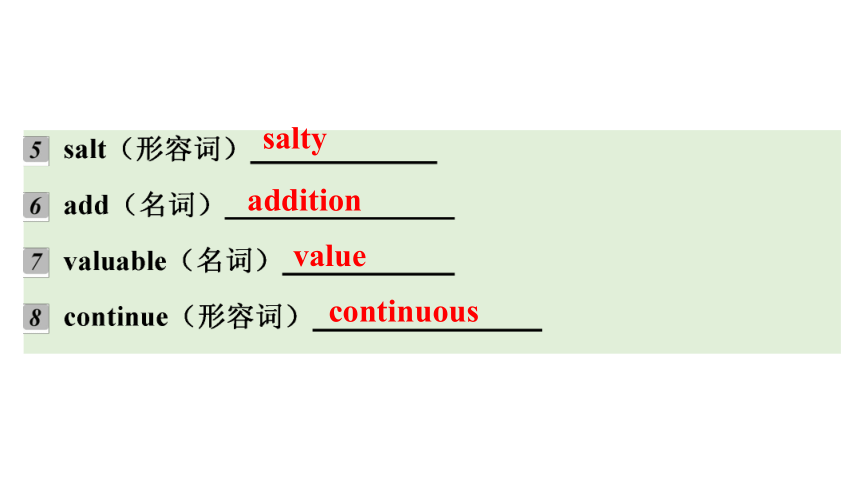
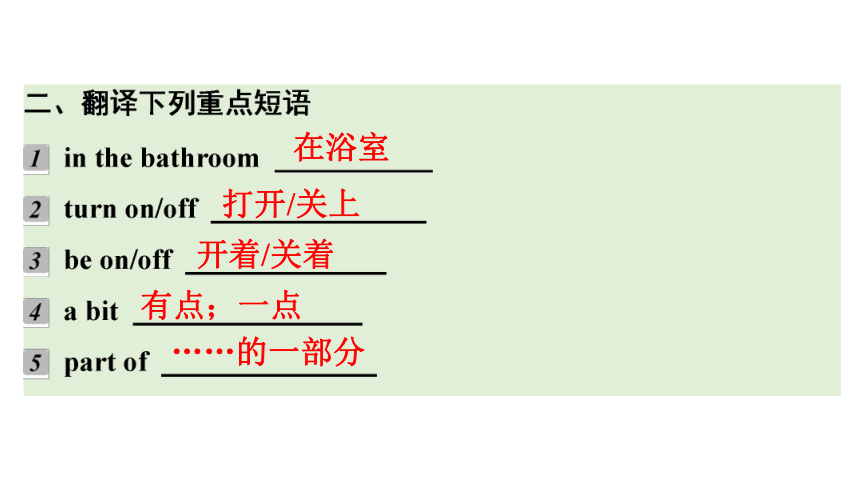
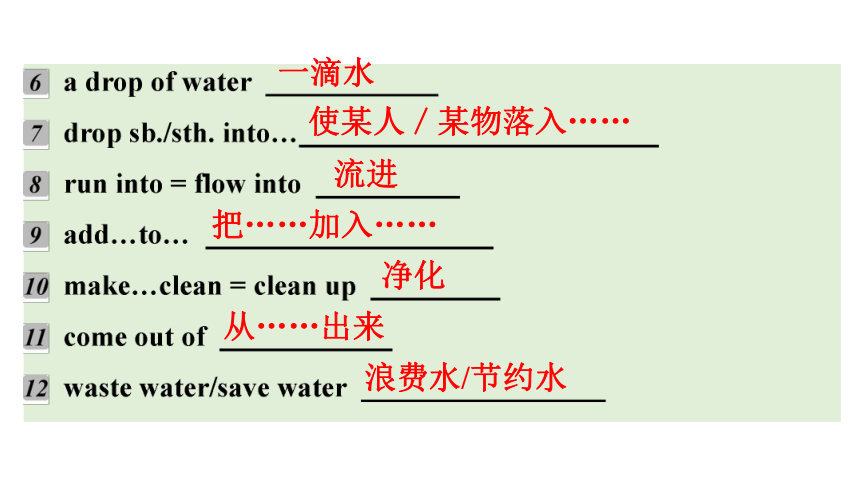
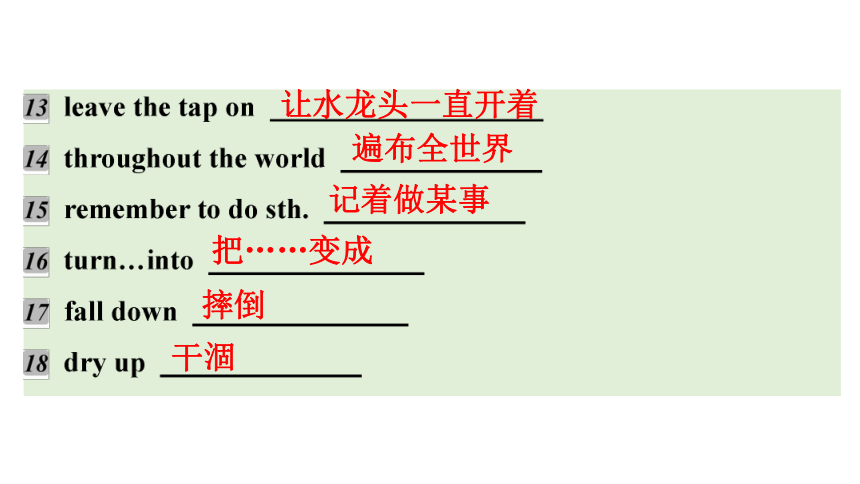
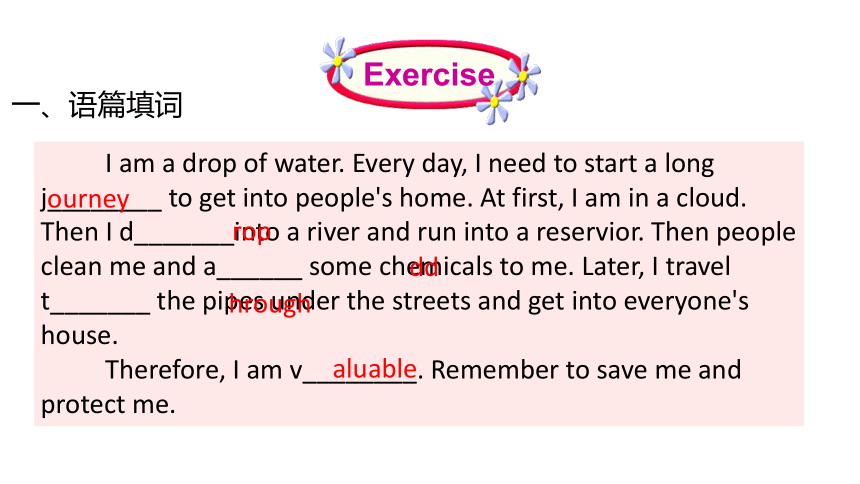
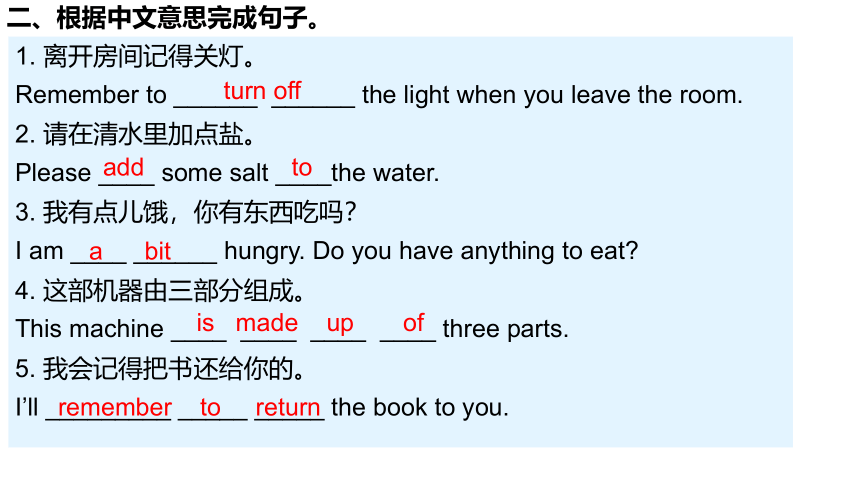
文档简介
(共50张PPT)
Words&Epression
Unit 5 Water
drop n. 滴 v. 掉下;落下
journey n. 旅行;旅程
quantity n. 数量
experiment n. 实验;试验
fresh adj. 淡的; 无盐的
salt n. 盐
on adv.(表示已连接、处于工作 状态或使用中)
voice n. 嗓音;说话声
*reservoir n. 水库
add v. 增加;添加
chemical n. 化学品
through prep. 通过;穿过
pipe n. 管道
valuable adj. 宝贵的;很有用的
bit n. 有点;一点
bank n. 银行
change n. 找给的零钱;找头
return v. 归还
*vapour n. 蒸气;雾气
form v. 形成;构成
*stir v. 搅拌
continue v. 继续
*crystal n. 结晶体
turn off 关掉
a bit 有点;一点
part of ……的一部分
pocket money (父母给孩子的)零花钱
(be) made up of 由……组成
dry up 干涸
dropped
trip
quantities
experiments
salty
addition
value
continuous
在浴室
打开/关上
开着/关着
有点;一点
……的一部分
一滴水
使某人/某物落入……
流进
把……加入……
净化
从……出来
浪费水/节约水
让水龙头一直开着
遍布全世界
记着做某事
把……变成
摔倒
干涸
Exercise
一、语篇填词
I am a drop of water. Every day, I need to start a long j________ to get into people's home. At first, I am in a cloud. Then I d_______into a river and run into a reservior. Then people clean me and a______ some chemicals to me. Later, I travel t_______ the pipes under the streets and get into everyone's house.
Therefore, I am v________. Remember to save me and protect me.
ourney
rop
dd
hrough
aluable
二、根据中文意思完成句子。
1. 离开房间记得关灯。
Remember to ______ ______ the light when you leave the room.
2. 请在清水里加点盐。
Please ____ some salt ____the water.
3. 我有点儿饿,你有东西吃吗?
I am ____ ______ hungry. Do you have anything to eat
4. 这部机器由三部分组成。
This machine ____ ____ ____ ____ three parts.
5. 我会记得把书还给你的。
I’ll _________ _____ _____ the book to you.
turn off
is made up of
a bit
add to
remember to return
Language points
Unit 5 Water
1. The tap was on. 水龙头开着。(P59 Line1)
on 在本句中为副词,表示已连接,处于工作状态或使用中,其反义词是off。如:
①电源通了。
The power is on.
②电源关了。
The power is off.
2. Turn that tap off,” said an angry voice. (P59 Line 2)
“把水龙头关掉。”一个声音生气地说道。
①turn off = switch off 意为“关掉(煤气、电器、电源或水龙头等)”,
它的反义词组是turn on =switch on,意为“打开(煤气、电器、电源或水龙头等)”
如: 离开前请关灯。
Please turn/switch off the lights before you leave.
Turn off the tap.
=
Turn the tap off.
it
注意:
当对象是名词时,既可以用turn sth off,也可以用turn off sth;
当对象是代词时,代词只能放在中间,即turn it / them off。
关水龙头。
补充:
表示“打开或关上窗户或门等”要用open和close。如:
关掉煤气
打开机器
打开它们
关门
打开窗户
.
turn the gas off
turn on the machine
turn them on
close the door
open the window
②voice n. 嗓音,说话声
其近义词有:sound和noise,三者的用法有所区别。
意义 例句
voice 一般指人的声音。 [ C,U ] ①She has a beautiful voice.
②Keep your voice down.
sound 指自然界的任何声音。[ C,U ] ①That’s a strange sound.
②Sound travels more slowly than light.
noise 常指不悦耳、不和谐的嘈杂声和噪音。[ C,U ] ①Don’t make a noise!
②They were making too much noise.
选用voice、sound或noise填空。
1. Can you hear the ________ of the rain
2. They like talking with each other in a low ________ in class.
3. Can you keep quiet The ________ will make the baby cry.
4. The ________ from the office sounds like your mother’s.
voice
sound
voice
noise
Practice
3. Then it was time for people to clean me. (P59 Line 8~9)
接下来就到了人们清洁我的时候了。
It’s time (for sb) to do sth
是(某人)做某事的时候了。
如:是我们上学的时间了。
It’s time for us to go to school.
4. They cleaned me and added some chemicals to me.
他们把我清洁干净,在我身上加入一些化学成分。(P59 Line 11)
add…to… 把……加入……
如:请在清水里加点盐。
Please add some salt to the water.
5. People will make me clean again.(P59 Line 14)
人们将再次净化我。
make为“使役动词”
make sb./sth. + adj. 意为 “使某人(或某物)...”
回顾:make sb./sth. + do 意为“使某人(或某物)做某事”
如: ①这部电影让我很开心。
This movie makes me very happy.
② 这部电影让我笑。
This movie makes me laugh.
6. Remember not to waste or pollute me. I'm valuable.
记住不要浪费我,也不要污染我。我很珍贵。(P59 Line 17~18)
remember not to do sth 记得不要(去)做某事
其肯定形式为remember to do sth,意为“记得要做某事”。
如:你必须记住不要污染环境。
You must remember not to pollute the environment.
1. 选择最佳答案。
( )Remember _____ too much meat.
A. don’t eat B. not eat
C. not to eat D. to not eat
2. 根据中文意思完成句子。
我会记得把书还给你的。
I’ll _________ _____ _____ the book to you.
remember to return
C
Practice
Grammar
Unit 5 Water
请观察下列句子,并找出句子中的名词。
1. They added some chemicals to me.
2. It stayed there for a few days.
3. I can speak a little French.
4. There isn't enough water in this bottle.
5. He made many mistakes in the exam.
6. There are no eggs or juice in the fridge.
7. I can't sleep because there is too much noise.
可数名词
countable nouns
不可数名词
uncountable nouns
1. They added some chemicals to me.
2. It stayed there for a few days.
3. I can speak a little French.
4. There isn't enough water in this bottle.
5. He made many mistakes in the exam.
6. There are no eggs or juice in the fridge.
7. I can't sleep because there is too much noise.
再观察:请找出修饰可数名词和不可数名词的量词。
你能归纳一下它们的用法吗?
Talk about quantities
We can use a lot of, a little, a few, (not) much, (not) many and no to talk about quantities.
There is/’s a lot of/a little/not much/no water in this bottle.
There are a lot of/many/a few/not many/no bottles of water in the fridge.
We use how many and how much to ask about quantities.
How much water is there in this bottle
How many bottles of water are there in the fridge
how much, a little和(not) much修饰不可数名词
how many, a few和(not) many修饰可数名词
a lot of 和 no修饰可数和不可数名词
much通常出现在否定句中。
Q: Is there a lot of water in the pool
A: No, there’s (1)
______________________.
no water in the pool
A Look at the pictures below and on page 64. Then complete the questions and answers.
Q: Is there a lot of water in the pool
A: Yes, there’s (2)
_______________.
Q: (3) ________ water is there in the pool
A: There are 157,500 litres of water in the pool.
a lot of water in the pool
How much
Q: Are there many people in the pool
A: Yes,(4)_________
______________________.
Q: (5)____________ people are there in the pool
A: There are 10 people in the pool.
there are
many people in the pool
How many
Q: Are there many people in the pool
A: (6)_____________
_____________________.
Q:(7)____________________________________________
A: There are only two people in the pool.
No, there aren’t many people in the pool
How many people
are there in the pool
We can use too much, too many, too little, too few and (not) enough to talk about quantities.
Quantities Examples
more than enough太多 too much water too many oranges
not enough不够 too little milk too few eggs
just right刚刚好 enough salt enough onions
too many和too few修饰可数名词
too much和too little修饰不可数名词
not enough修饰可数和不可数名词
B Dora and Jane want to cook orange beef. They are checking whether they have enough plete their conversations.
Dora: Do we have (1)________beef,
Jane
Jane: No, we don’t. We only have
200 grams.
Dora: We need to buy some more
beef. (2)___________ onions
do we have
Jane: We don’t have any!
Dora : Let’s buy two onions then.
enough
How many
Dora and Jane have:
orange juice 20 ml
sugar 5 g
cooking oil 100 ml
onions 0
beef 200 g
oranges 1
Dora: (3)_________ cooking oil do we have
Jane: We have 100 millilitres. That’s more than
enough. We shouldn’t add (4)_______
cooking oil.
Dora: Do we need to buy any sugar
Jane: Yes, we do. We only have five grams. The dish
will be too sour if we add (5)______ sugar. By
the way, we have (6)______ orange juice.
Dora: Great! Let’s go to the supermarket now!
How much
too much
too little
enough
Dora and Jane have:
orange juice 20 ml
sugar 5 g
cooking oil 100 ml
onions 0
beef 200 g
oranges 1
Summary
描述数量 提问数量
修饰可数 名词 (not) many, a great / large / small number of,a few,few, too many,too few how many
修饰不可 数名词 (not) much,a great deal of,a great / large / small amount of,a little,little,too much,too little how much
既可修饰可数名词, 也可修饰不可数名词 a lot of,lots of,plenty of,some, any,no,(not) enough
表示肯定 表示否定
意义 “一些;少许的” “几乎没有的”
修饰可数名词 a few few
修饰不可数名词 a little little
a few,few,a little 和little 描述数量很少或几乎没有,数量的差别主要是主观上的,而不是实际数据上的。具体用法区别如下:
There are a few people in the room.
房间里有几个人。(强调还有一些人)
There are few people in the room.
房间里没有几个人。(强调几乎没有人)
I have a little money.
我有一点点钱。(强调还有少许钱)
I have little money.
我快没钱了。(强调几乎没有钱)
意义 “太多的” “足够的” “太少的”
修饰可数名词 too many too few
修饰不可数名词 too much too little
既可修饰可数名词, 也可修饰不可数名词 enough
too many,too few,too much,too little 和enough 描述数量是否足够。具体用法区别如下:
如:There are too many books on the shelf.
架子上有太多书了。
There is too little bread in her fridge.
她的冰箱里面包太少了。
She doesn’t have enough pens.
她没有足够的钢笔。
enough 意为“足够的;足够地”,可用于可数名词复数形式或不可数名词之前,也可用于动词、形容词或副词之后。如
足够的钱
吃得足够多
足够深
足够快
enough money
eat enough
deep enough
fast enough
some 接可数名词复数形式或不可数名词 一般用于肯定句或提建议的句子中
any 接可数名词或不可数名词 一般用于否定句或疑问句中
some和any用在不同的句型中。具体用法区别如下:
如:
Would you like some milk
你想要些牛奶吗?
I never make any promises.
我从来不做任何承诺。
Review
Unit 5 Water
I. 选用much、many、few、a few、little或a little填空。
1. There are ________ buses in London.
2. I have ________ time to study. Tomorrow is the final exam.
3. Please don’t make so ________noise.
4. There is still ___________ eggs in the bottle. It’s enough.
5. There are just very ________ films of this sort.
6. Bob said that he had ________ money, so he could still buy me a gift.
many
little
much
a little
a few
few
II. 请就划线部分提问。
1. There is five glasses of milk in the fridge.
2. There is 100 yuan on the table.
3. Mary has hundreds of books in her room.
4. He wants two pieces of bread.
How much milk is there in the fridge
How much money is there on the table
How many books does Mary have in her room
How much bread does he want
III. 选择最佳答案填空。
( )1. Drinking ____ tea is bad for your health.
A. too much B. too many
C. a few D. a little
( )2. You spent ____ time on the meanings of
the words so that you couldn’t understand
the whole passage.
A. too many B. too much
C. enough D. too little
A
B
( )3. Positive (积极的) thinking alone is ____ to
turn your life around and you should do it
at the same time!
A. too much B. too many
C. enough D. not enough
( )4. There are ____ posts for so many people
this year! We must fire some people.
A. too little B. too many
C. too few D. too much
D
C
( )5. Would you like ____water
A. some B. many C. any D. much
( )6. They don’t have __idea!
A. some B. many C. any D. a few
C
A
Thank you
Words&Epression
Unit 5 Water
drop n. 滴 v. 掉下;落下
journey n. 旅行;旅程
quantity n. 数量
experiment n. 实验;试验
fresh adj. 淡的; 无盐的
salt n. 盐
on adv.(表示已连接、处于工作 状态或使用中)
voice n. 嗓音;说话声
*reservoir n. 水库
add v. 增加;添加
chemical n. 化学品
through prep. 通过;穿过
pipe n. 管道
valuable adj. 宝贵的;很有用的
bit n. 有点;一点
bank n. 银行
change n. 找给的零钱;找头
return v. 归还
*vapour n. 蒸气;雾气
form v. 形成;构成
*stir v. 搅拌
continue v. 继续
*crystal n. 结晶体
turn off 关掉
a bit 有点;一点
part of ……的一部分
pocket money (父母给孩子的)零花钱
(be) made up of 由……组成
dry up 干涸
dropped
trip
quantities
experiments
salty
addition
value
continuous
在浴室
打开/关上
开着/关着
有点;一点
……的一部分
一滴水
使某人/某物落入……
流进
把……加入……
净化
从……出来
浪费水/节约水
让水龙头一直开着
遍布全世界
记着做某事
把……变成
摔倒
干涸
Exercise
一、语篇填词
I am a drop of water. Every day, I need to start a long j________ to get into people's home. At first, I am in a cloud. Then I d_______into a river and run into a reservior. Then people clean me and a______ some chemicals to me. Later, I travel t_______ the pipes under the streets and get into everyone's house.
Therefore, I am v________. Remember to save me and protect me.
ourney
rop
dd
hrough
aluable
二、根据中文意思完成句子。
1. 离开房间记得关灯。
Remember to ______ ______ the light when you leave the room.
2. 请在清水里加点盐。
Please ____ some salt ____the water.
3. 我有点儿饿,你有东西吃吗?
I am ____ ______ hungry. Do you have anything to eat
4. 这部机器由三部分组成。
This machine ____ ____ ____ ____ three parts.
5. 我会记得把书还给你的。
I’ll _________ _____ _____ the book to you.
turn off
is made up of
a bit
add to
remember to return
Language points
Unit 5 Water
1. The tap was on. 水龙头开着。(P59 Line1)
on 在本句中为副词,表示已连接,处于工作状态或使用中,其反义词是off。如:
①电源通了。
The power is on.
②电源关了。
The power is off.
2. Turn that tap off,” said an angry voice. (P59 Line 2)
“把水龙头关掉。”一个声音生气地说道。
①turn off = switch off 意为“关掉(煤气、电器、电源或水龙头等)”,
它的反义词组是turn on =switch on,意为“打开(煤气、电器、电源或水龙头等)”
如: 离开前请关灯。
Please turn/switch off the lights before you leave.
Turn off the tap.
=
Turn the tap off.
it
注意:
当对象是名词时,既可以用turn sth off,也可以用turn off sth;
当对象是代词时,代词只能放在中间,即turn it / them off。
关水龙头。
补充:
表示“打开或关上窗户或门等”要用open和close。如:
关掉煤气
打开机器
打开它们
关门
打开窗户
.
turn the gas off
turn on the machine
turn them on
close the door
open the window
②voice n. 嗓音,说话声
其近义词有:sound和noise,三者的用法有所区别。
意义 例句
voice 一般指人的声音。 [ C,U ] ①She has a beautiful voice.
②Keep your voice down.
sound 指自然界的任何声音。[ C,U ] ①That’s a strange sound.
②Sound travels more slowly than light.
noise 常指不悦耳、不和谐的嘈杂声和噪音。[ C,U ] ①Don’t make a noise!
②They were making too much noise.
选用voice、sound或noise填空。
1. Can you hear the ________ of the rain
2. They like talking with each other in a low ________ in class.
3. Can you keep quiet The ________ will make the baby cry.
4. The ________ from the office sounds like your mother’s.
voice
sound
voice
noise
Practice
3. Then it was time for people to clean me. (P59 Line 8~9)
接下来就到了人们清洁我的时候了。
It’s time (for sb) to do sth
是(某人)做某事的时候了。
如:是我们上学的时间了。
It’s time for us to go to school.
4. They cleaned me and added some chemicals to me.
他们把我清洁干净,在我身上加入一些化学成分。(P59 Line 11)
add…to… 把……加入……
如:请在清水里加点盐。
Please add some salt to the water.
5. People will make me clean again.(P59 Line 14)
人们将再次净化我。
make为“使役动词”
make sb./sth. + adj. 意为 “使某人(或某物)...”
回顾:make sb./sth. + do 意为“使某人(或某物)做某事”
如: ①这部电影让我很开心。
This movie makes me very happy.
② 这部电影让我笑。
This movie makes me laugh.
6. Remember not to waste or pollute me. I'm valuable.
记住不要浪费我,也不要污染我。我很珍贵。(P59 Line 17~18)
remember not to do sth 记得不要(去)做某事
其肯定形式为remember to do sth,意为“记得要做某事”。
如:你必须记住不要污染环境。
You must remember not to pollute the environment.
1. 选择最佳答案。
( )Remember _____ too much meat.
A. don’t eat B. not eat
C. not to eat D. to not eat
2. 根据中文意思完成句子。
我会记得把书还给你的。
I’ll _________ _____ _____ the book to you.
remember to return
C
Practice
Grammar
Unit 5 Water
请观察下列句子,并找出句子中的名词。
1. They added some chemicals to me.
2. It stayed there for a few days.
3. I can speak a little French.
4. There isn't enough water in this bottle.
5. He made many mistakes in the exam.
6. There are no eggs or juice in the fridge.
7. I can't sleep because there is too much noise.
可数名词
countable nouns
不可数名词
uncountable nouns
1. They added some chemicals to me.
2. It stayed there for a few days.
3. I can speak a little French.
4. There isn't enough water in this bottle.
5. He made many mistakes in the exam.
6. There are no eggs or juice in the fridge.
7. I can't sleep because there is too much noise.
再观察:请找出修饰可数名词和不可数名词的量词。
你能归纳一下它们的用法吗?
Talk about quantities
We can use a lot of, a little, a few, (not) much, (not) many and no to talk about quantities.
There is/’s a lot of/a little/not much/no water in this bottle.
There are a lot of/many/a few/not many/no bottles of water in the fridge.
We use how many and how much to ask about quantities.
How much water is there in this bottle
How many bottles of water are there in the fridge
how much, a little和(not) much修饰不可数名词
how many, a few和(not) many修饰可数名词
a lot of 和 no修饰可数和不可数名词
much通常出现在否定句中。
Q: Is there a lot of water in the pool
A: No, there’s (1)
______________________.
no water in the pool
A Look at the pictures below and on page 64. Then complete the questions and answers.
Q: Is there a lot of water in the pool
A: Yes, there’s (2)
_______________.
Q: (3) ________ water is there in the pool
A: There are 157,500 litres of water in the pool.
a lot of water in the pool
How much
Q: Are there many people in the pool
A: Yes,(4)_________
______________________.
Q: (5)____________ people are there in the pool
A: There are 10 people in the pool.
there are
many people in the pool
How many
Q: Are there many people in the pool
A: (6)_____________
_____________________.
Q:(7)____________________________________________
A: There are only two people in the pool.
No, there aren’t many people in the pool
How many people
are there in the pool
We can use too much, too many, too little, too few and (not) enough to talk about quantities.
Quantities Examples
more than enough太多 too much water too many oranges
not enough不够 too little milk too few eggs
just right刚刚好 enough salt enough onions
too many和too few修饰可数名词
too much和too little修饰不可数名词
not enough修饰可数和不可数名词
B Dora and Jane want to cook orange beef. They are checking whether they have enough plete their conversations.
Dora: Do we have (1)________beef,
Jane
Jane: No, we don’t. We only have
200 grams.
Dora: We need to buy some more
beef. (2)___________ onions
do we have
Jane: We don’t have any!
Dora : Let’s buy two onions then.
enough
How many
Dora and Jane have:
orange juice 20 ml
sugar 5 g
cooking oil 100 ml
onions 0
beef 200 g
oranges 1
Dora: (3)_________ cooking oil do we have
Jane: We have 100 millilitres. That’s more than
enough. We shouldn’t add (4)_______
cooking oil.
Dora: Do we need to buy any sugar
Jane: Yes, we do. We only have five grams. The dish
will be too sour if we add (5)______ sugar. By
the way, we have (6)______ orange juice.
Dora: Great! Let’s go to the supermarket now!
How much
too much
too little
enough
Dora and Jane have:
orange juice 20 ml
sugar 5 g
cooking oil 100 ml
onions 0
beef 200 g
oranges 1
Summary
描述数量 提问数量
修饰可数 名词 (not) many, a great / large / small number of,a few,few, too many,too few how many
修饰不可 数名词 (not) much,a great deal of,a great / large / small amount of,a little,little,too much,too little how much
既可修饰可数名词, 也可修饰不可数名词 a lot of,lots of,plenty of,some, any,no,(not) enough
表示肯定 表示否定
意义 “一些;少许的” “几乎没有的”
修饰可数名词 a few few
修饰不可数名词 a little little
a few,few,a little 和little 描述数量很少或几乎没有,数量的差别主要是主观上的,而不是实际数据上的。具体用法区别如下:
There are a few people in the room.
房间里有几个人。(强调还有一些人)
There are few people in the room.
房间里没有几个人。(强调几乎没有人)
I have a little money.
我有一点点钱。(强调还有少许钱)
I have little money.
我快没钱了。(强调几乎没有钱)
意义 “太多的” “足够的” “太少的”
修饰可数名词 too many too few
修饰不可数名词 too much too little
既可修饰可数名词, 也可修饰不可数名词 enough
too many,too few,too much,too little 和enough 描述数量是否足够。具体用法区别如下:
如:There are too many books on the shelf.
架子上有太多书了。
There is too little bread in her fridge.
她的冰箱里面包太少了。
She doesn’t have enough pens.
她没有足够的钢笔。
enough 意为“足够的;足够地”,可用于可数名词复数形式或不可数名词之前,也可用于动词、形容词或副词之后。如
足够的钱
吃得足够多
足够深
足够快
enough money
eat enough
deep enough
fast enough
some 接可数名词复数形式或不可数名词 一般用于肯定句或提建议的句子中
any 接可数名词或不可数名词 一般用于否定句或疑问句中
some和any用在不同的句型中。具体用法区别如下:
如:
Would you like some milk
你想要些牛奶吗?
I never make any promises.
我从来不做任何承诺。
Review
Unit 5 Water
I. 选用much、many、few、a few、little或a little填空。
1. There are ________ buses in London.
2. I have ________ time to study. Tomorrow is the final exam.
3. Please don’t make so ________noise.
4. There is still ___________ eggs in the bottle. It’s enough.
5. There are just very ________ films of this sort.
6. Bob said that he had ________ money, so he could still buy me a gift.
many
little
much
a little
a few
few
II. 请就划线部分提问。
1. There is five glasses of milk in the fridge.
2. There is 100 yuan on the table.
3. Mary has hundreds of books in her room.
4. He wants two pieces of bread.
How much milk is there in the fridge
How much money is there on the table
How many books does Mary have in her room
How much bread does he want
III. 选择最佳答案填空。
( )1. Drinking ____ tea is bad for your health.
A. too much B. too many
C. a few D. a little
( )2. You spent ____ time on the meanings of
the words so that you couldn’t understand
the whole passage.
A. too many B. too much
C. enough D. too little
A
B
( )3. Positive (积极的) thinking alone is ____ to
turn your life around and you should do it
at the same time!
A. too much B. too many
C. enough D. not enough
( )4. There are ____ posts for so many people
this year! We must fire some people.
A. too little B. too many
C. too few D. too much
D
C
( )5. Would you like ____water
A. some B. many C. any D. much
( )6. They don’t have __idea!
A. some B. many C. any D. a few
C
A
Thank you
